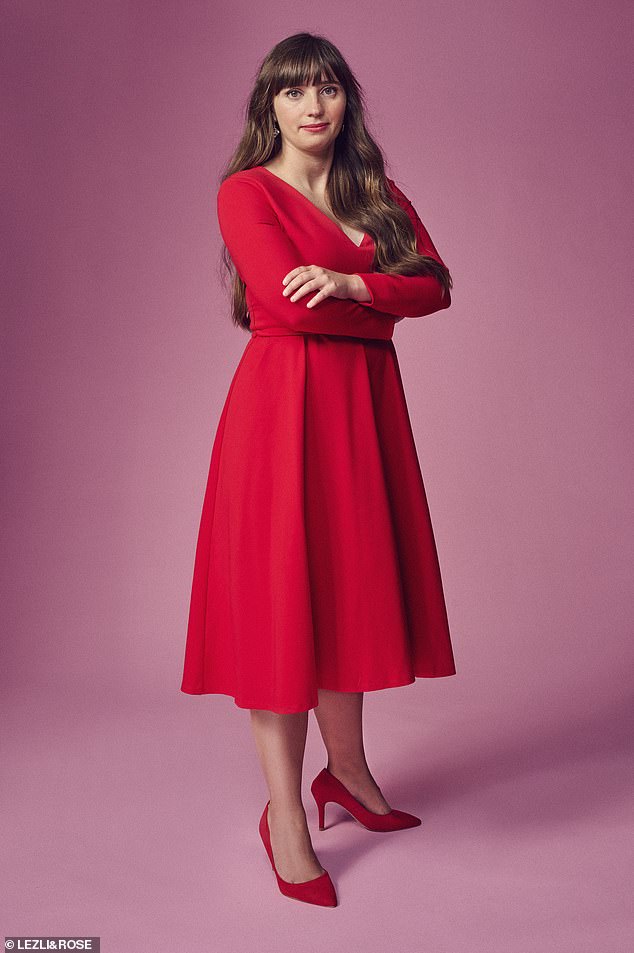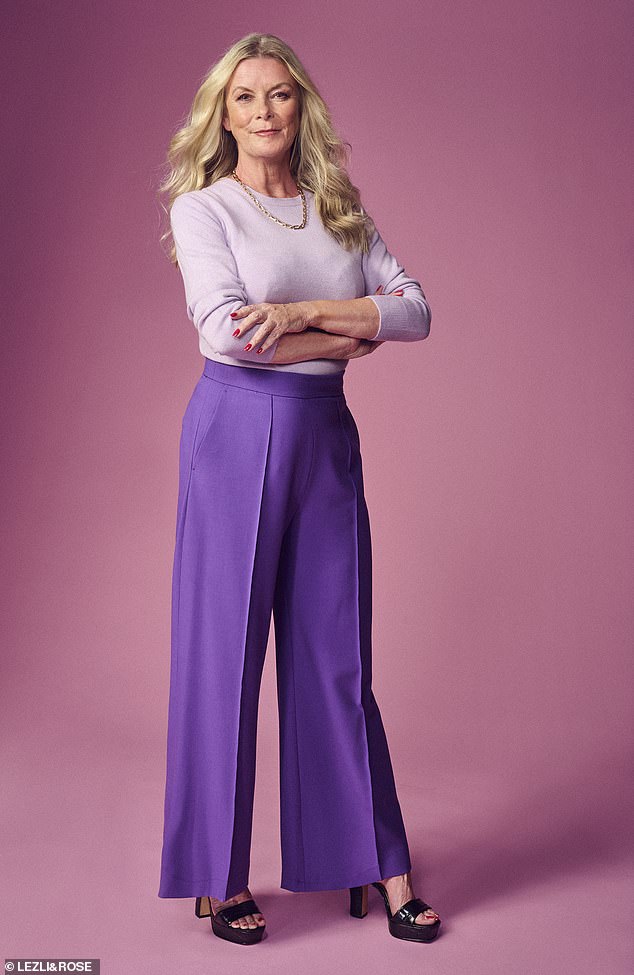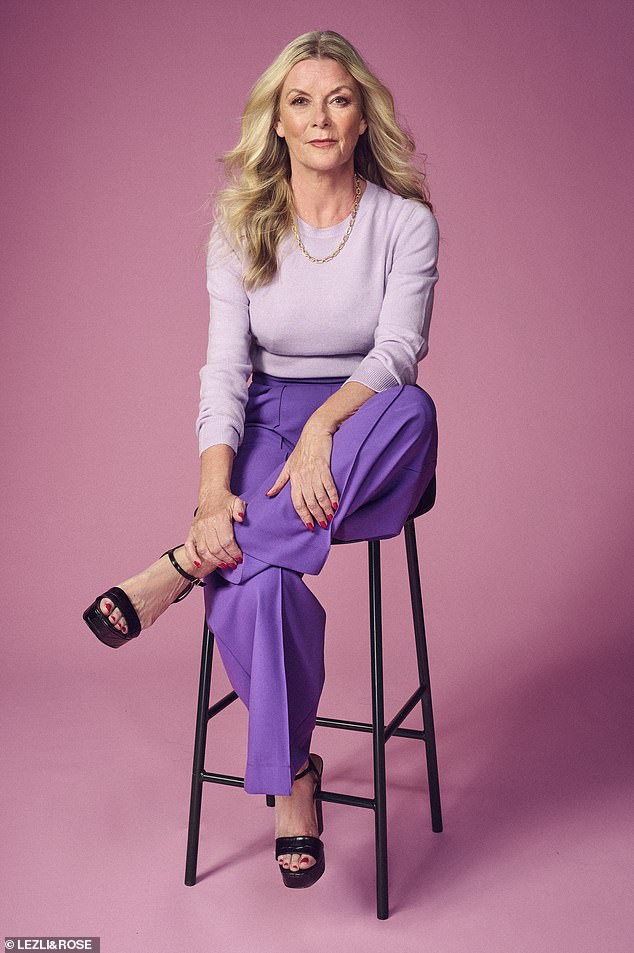When Natalie Clark’s wedding day finally arrived after two years of planning, she had a nagging feeling about the future.
As she walked down the aisle she knew, deep down, that she and her husband-to-be would not be together ’til death do us part.
‘Did I think I’d be married for ever? No I didn’t,’ admits Natalie, 30, from Bingley, West Yorkshire. ‘That’s not to say there was anything wrong with my fiance — there wasn’t. I did love him.
‘But as I listened tearfully to the church music I’d chosen, I knew that we weren’t going to be spending our retirement years together.’
And Natalie was right. Four years after their 2018 wedding, the couple divorced.
FEMAIL’s survey suggests that matrimony — a state once considered to be the glue that holds the fabric of society together — faces assaults on several fronts (stock image)
You might well wonder why she didn’t end the relationship before reaching the altar. Why she didn’t hold out for a man she did want to spend the rest of her life with?
The reason is that she didn’t — and still doesn’t — believe marriage for life is practical in this day and age.
In her mind, it wouldn’t matter who the man was — the eventual outcome would still be the same.
‘I think it’s unrealistic to assume that marriage will be for ever,’ Natalie admits.
‘It’s inevitable that things will change in a relationship over the years, no matter how much you love the other person at the start.
‘I know of couples who are quite old, and it’s obvious that they can’t stand each other — they stay married because that generation just puts up with it.
‘Whereas my generation of women recognise that if we’re not happy with something, we can do something about it.
‘There’s no harm in entering marriage without truly believing it will be for ever.’
As counter-intuitive as this may sound, Natalie’s opinions chime with a ground-breaking new marriage survey conducted by Femail. Our survey shows that only 36 per cent of people believe unconditionally that marriage is meant to be lifelong.
And while gender stereotypes would have us believe men are the commitment-phobes, our research suggests otherwise.

No plans to wed: Daisy Chapman, a 30-year-old events organiser from London, believes a husband would hold her back in her career
While 46 per cent of men said they believe that, though marriage is meant to be a lifelong commitment, this usually isn’t practical, 51 per cent of women agreed with the sentiment.
Among those aged 18 to 24, half no longer believe a lifelong union is realistic, with a further 17 per cent saying that monogamy is unnatural.
Intrigued by soaring divorce rates and the plummeting number of marriages recorded by the Office for National Statistics — down by almost 37 per cent since 1989 — we commissioned a comprehensive study into marriage, asking more than 1,000 people aged 18 and over for their views.
Last week, in the first part of our exclusive report, we revealed that, surprisingly, 78 per cent of married people would not leave their marriage if they no longer desired their spouse.
In general, however, our survey suggests that matrimony — a state once considered to be the glue that holds the fabric of society together — faces assaults on several fronts.
A third of 25 to 34-year-olds say they don’t believe marriage is relevant today.
Meanwhile of the participants who had never been married, 44 per cent said they did not want to get married in the future. And as many as 61 per cent of those whose marriages had resulted in divorce would not consider tying the knot again.
Today, in part two, we explore whether the ease of getting a divorce is engendering a defeatist attitude to marriage — and making the idea of the ‘sanctity of marriage’ a thing of the past.
‘Our grandparents’ generation stayed married until death,’ says divorce coach and relationship expert Sara Davison. ‘Marriage truly was for life.
‘Generally speaking, today’s culture is more disposable — if we don’t like our mobile phone, our job, our lifestyle, then we look to change it.

Daisy doesn’t think it’s practical to view marriage as lasting. Conscious that her personality will evolve as she ages, there’s a chance she and a husband would eventually stop being compatible
‘If our marriage isn’t working, then we might look to try to fix what’s wrong. But, ultimately, people know that if it doesn’t feel right, then they won’t be judged for calling it a day.
‘The survey confirms there is no longer personal stigma attached to divorce. This is reflected in the celebrity world.
‘We see famous couples chop and change their relationships very quickly; cultural examples of life-long partnerships are becoming extremely rare.’
Natalie Clark admits she didn’t dwell on the solemnity of her vows before entering marriage.
Having met her partner when they were teenagers, she says after a decade together, marriage felt like the natural next step.
‘I actually pushed him to propose and pretty much picked my ring,’ she says. ‘I even hinted at a good time and place to do it — on the beach during our annual family holiday to Norfolk.
‘We were following society’s textbook: we’d both got decent jobs — me as a manager for a local authority department and him as a senior coordinator in the transport industry — and we were planning on buying a house together. Marriage was the next thing on the list.
‘As for the wedding itself, we had about 60 guests and it cost us £14,000. I was more concerned about everyone having a good time than the marriage itself.’
Natalie blames the claustrophobic effect of lockdown for highlighting the fact they had grown apart.
‘Being trapped in the house together gave me a lot of thinking time,’ she says. ‘I realised the next item on the list was children, and I didn’t want children with him.’

Rae Radford would not have got divorced for a third time if it weren’t for the law change in April 2022 which brought in the no-fault divorce
They split in 2020 and, after a lengthy process of selling the house, they divorced in 2022.
‘I felt sad for him because he didn’t want us to split,’ she says. ‘But far from feeling a failure, I felt overwhelming relief.’
In Natalie’s case, it wasn’t enough to deter her from re-marrying.
She is now engaged to her new partner. But there’ll be no big expensive bash: ‘I want to marry him for who he is and not for the big day. It feels different this time.’
That said, she remains circumspect: ‘Of course, I’m hoping that it will be for ever, and while I see us together for the foreseeable future — who knows?’
After all, since the introduction of the no-fault divorce in April last year, it’s never been easier to walk away.
Not only is it no longer necessary to apportion blame, as long as you agree on custody arrangements and the split of marital assets, you simply fill out an online form and pay the £593 fee.
According to figures released by His Majesty’s Courts and Tribunals Service, divorce applications increased by a massive 92 per cent the month the change was made, compared to the number of online divorce petitions filed in April 2021.
Rae Radford admits taking advantage of the law change.
Having found the end of her first two marriages stressful and emotionally draining, she was loathe to endure the protracted process all over again when her third marriage also collapsed after 23 years.

Compared to her two previous divorces, which were both stressful and emotionally draining, Rae’s third was ‘incredibly easy’. Rae and her husband filled out the form and split the £593 fee, and two months later their divorce was finalised
‘I couldn’t face another blame game,’ says Rae, 61, a professional dog-walker from Kent.
‘I had truly believed that third time round we’d be together for ever.
‘But when things didn’t work out, I knew that having to state a valid reason for wanting a divorce would once again immediately set a difficult tone.’
The couple split in 2018 and Rae says they would ‘still be married’ were it not for no-fault divorce.
She promptly told her ex she wanted to formalise the split, adding: ‘It was incredibly easy. Filling out the form took 15 minutes and we went halves on the fee. There were no solicitors involved and two months later our divorce was finalised. If it weren’t for this change, we’d still be married.’
And herein lies a niggling concern: is it now a little too easy to go your own separate ways?
‘I’d hate to think that young couples hitting a rough patch might quit in a fit of pique without considering whether their marriage could be saved,’ says Rae.
‘It’s all so fast you suddenly find yourself a divorcee a couple of months later with no way back.

Among those aged 18 to 24, 50 per cent no longer believe a lifelong union is realistic — with a further 17 per cent saying that monogamy is unnatural (stock image)
‘I can see how some people could end up with regrets.’
Another startling finding from our survey is the extent to which women like Natalie and Rae have become a driving force behind divorce.
More than half of female divorcees told us that they led the decision. By comparison, just 18 per cent of men said they had instigated their divorce.
It took me 15 minutes to get a no-fault divorce. I’d hate to think that in future no one will try to save their marriage – Rae Radford
Last month Susan Parker, 55, told her husband of 30 years their marriage was over. ‘He hasn’t been unfaithful, I’ve not got a lover waiting in the wings and he’s not an alcoholic,’ she explains.
‘I’ve just had enough of his dismissive tone when he speaks to me, and I am sick to death of competing for his attention with the apps on his phone and his golf club friends.
‘After three decades of having to take his wants and needs into consideration on a daily basis, I want to live alone.
‘Our two kids are grown up, and we’ve enough equity in our home for us each to be able to buy a modest house outright. Basically, I’m done.’
She adds: ‘He’s very upset right now. He thought things were OK between us, and maybe they were for him. But I want more for myself as I enter what feels like the autumn of my life.’
Dave Thomas, 48, from Nottingham, knows only too well what it’s like to get divorced against your wishes.
Like 67 per cent of the male divorcees we spoke to, he says the experience was so awful he will never marry again.
A sales executive in the motor industry, Dave, a father of one who is single, says he believed that he and his wife could work through their marital issues.
‘We’d moved to France to renovate a property and start a new business and that put us under pressure.’
Unforeseen issues meant that Dave had to spend more time in the UK than they’d envisaged.
‘While I was away, we’d communicate with one another via social media and one day, out of the blue, I got a WhatsApp message from her calling time on our marriage.
‘Clearly, her mind was made up. I thought maybe we could go down the counselling route, but she didn’t want to even try to save the marriage.
‘Devastated doesn’t begin to describe how I felt. To suddenly have your family ripped from you is very hard to come to terms with.’
Four years on, Dave says the experience means that he won’t remarry. ‘Marriage seems to have lost its place in society. All marriages have ups and downs, but no one wants to work through those moments.’
Meanwhile, more and more young people are turning their backs on the institution altogether.
A worrying 29 per cent of people across all ages told us they believe marriage is no longer relevant.
Daisy Chapman, a 30-year-old events organiser from London, is adamant she will never marry.
She finds the idea of committing to one person for the rest of her life suffocating. ‘A husband would hold me back,’ she says bluntly.
‘As someone’s wife, I’d have to constantly consider their needs and expectations in a way that isn’t expected when things are less formal.
‘That could get in the way of my career, and even influence things like where I live. I don’t want someone else having that much sway over what my life looks like.’
Echoing the belief of many respondents that it is just not practical to view marriage as lasting, she adds: ‘I expect my personality to constantly evolve as I age.
‘Why would I legally bind myself to another person knowing that there’s every chance we’ll eventually stop being compatible?’
Some might say it’s possible for two people to evolve in tandem. Others, however, will think Daisy is just being realistic.
Indeed, more than 18 per cent of the divorcees we spoke to said their marriage ended because they had simply grown apart.
However, like an increasing number of people, Daisy says not getting married ‘won’t stop [her] having kids, or living with someone’.
For her, it is not the idea of the family that has had its day, but that of the formal union of two people ’til death do they part.
‘Marriage is old-fashioned, expensive and irrelevant, so why should I bother?’ she concludes.
A sentiment that threatens to cast a shadow over the age-old institution itself.
- Some names in this article have been changed
- Questionnaire carried out by Survation, which reviewed a representative sample of 1,012 adults across the UK over the age of 18

